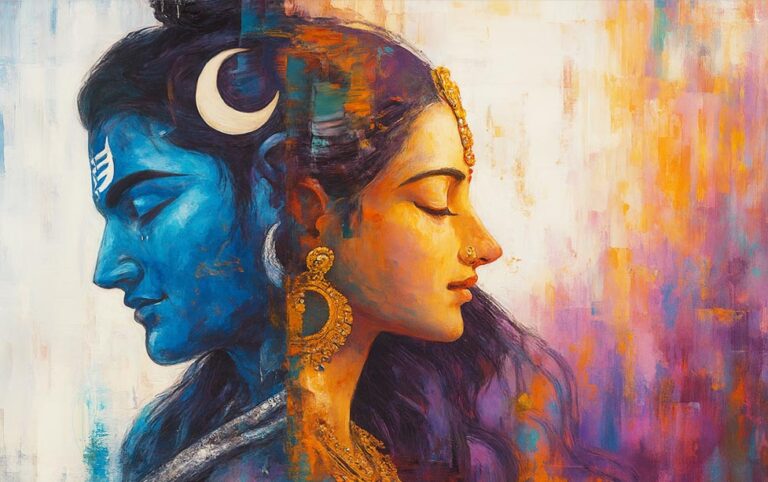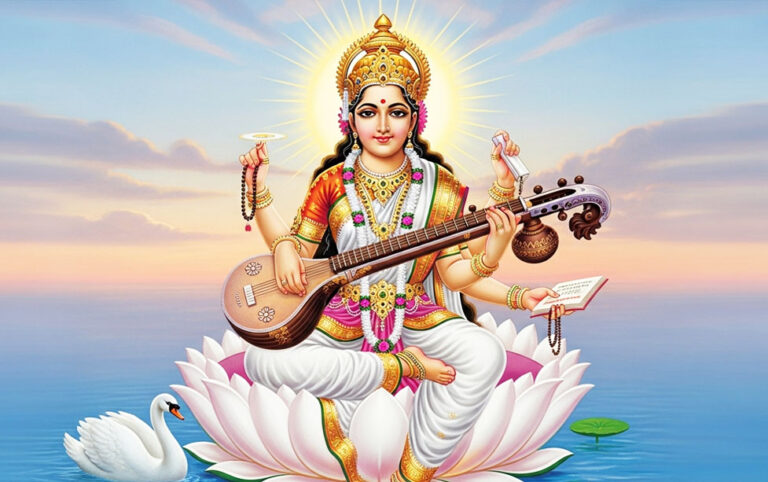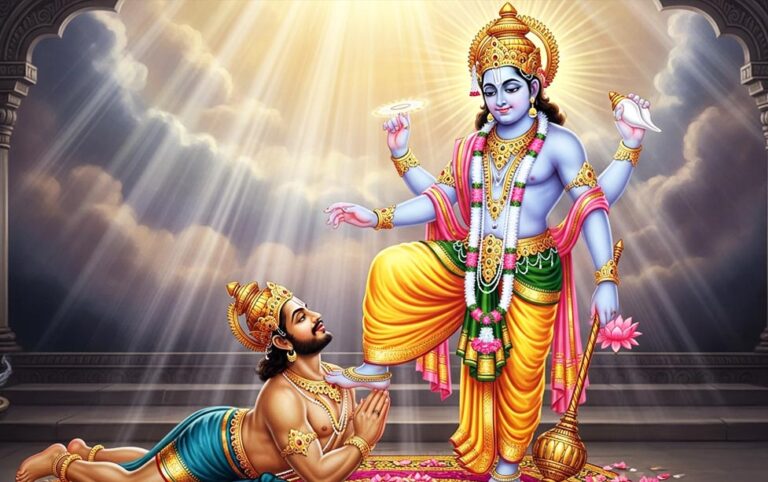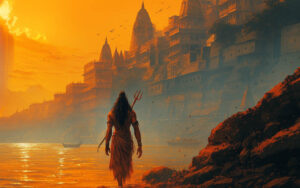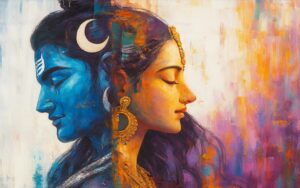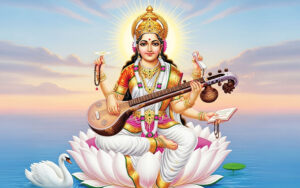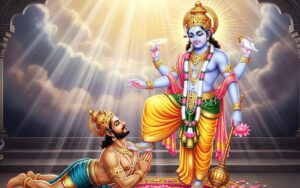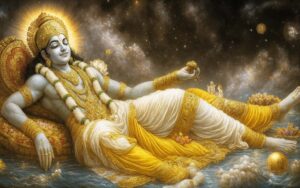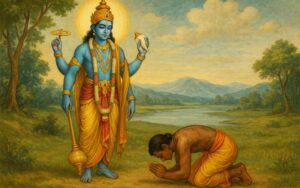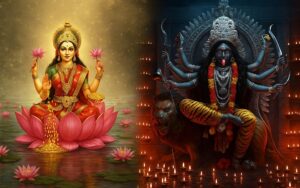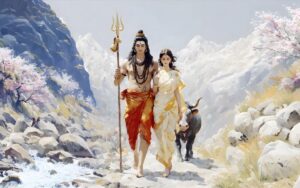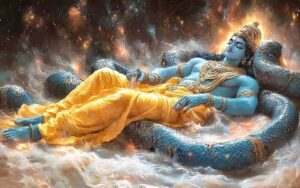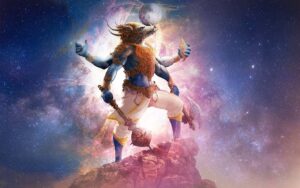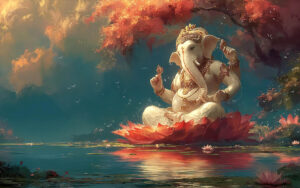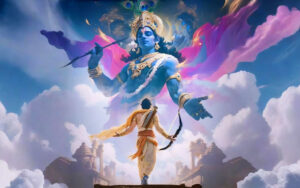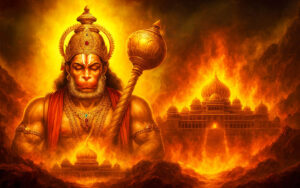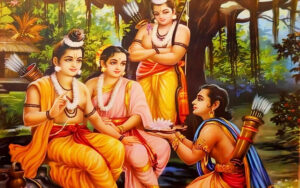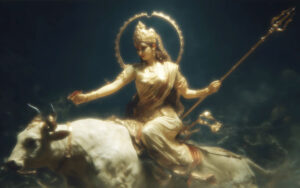
No time for reading the story? Give it a listen on Spotify.

In this story, Krishna reveals to Arjuna the divine significance of Devshayani Ekadashi by narrating the tale of King Mandhata.
Characters in the story:
Lord Krishna: Lord Krishna is one of the most popular and revered deities in Hinduism. He is worshiped as the eighth avatar of Lord Vishnu and is known for his divine teachings in the Bhagavad Gita and for his role in the epic Mahabharata.
![]()
Arjuna: Arjuna is a skilled and virtuous warrior prince and one of the central characters in Mahabharata. He is renowned for his archery prowess and is a key figure in the Kurukshetra War, where he faces moral dilemmas on the battlefield, eventually receiving divine guidance from Lord Krishna.
One day, Arjuna approached Lord Krishna with a sincere question.
“O Lord,” he asked, “what is the significance of the Ekadashi that falls during the Shukla Paksha of the month of Ashadha? Which deity is worshipped on this day, and how should one observe the fast? Please explain everything in detail.”
Lord Krishna smiled and replied, “O Arjuna, this very question was once asked by the divine sage Narada to Lord Brahma. In response, Lord Brahma said, ‘Narada, you have asked a question that brings salvation to all beings, especially in this dark age of Kaliyuga. The Ekadashi fast is supreme among all fasts, for it has the power to erase all sins. The Ekadashi you refer to is called Devshayani Ekadashi. When this fast is observed with devotion, Lord Vishnu himself is pleased.’”
“But this day holds even deeper significance,” Krishna continued. “Every year on Devshayani Ekadashi, Lord Vishnu—the sustainer of the universe—enters Yog-Nidra, a divine sleep in the Kshir Sagar, for a period of four months. This marks the beginning of Chaturmas, a sacred phase in Sanatan Dharma when the devas rest, the world slows down, and seekers turn inward. From the month of Ashadha to Kartik, Vishnu withdraws from worldly affairs.
During his divine rest, cosmic responsibility is passed on: Shiva, the great Mahadev, silently upholds dharma during Shravan; Ganesha brings wisdom and clarity in Bhadrapad; the Pitrs (ancestors) are honored in Ashwin; and finally, Devi Durga rises in the month of Kartik, during Navratri, to sustain the universe with her power. This is a profound cosmic rhythm. Weddings and major rituals are traditionally paused during these months—not out of restriction, but as an invitation for inner sadhana. The gods rest, but they dwell in the hearts of those who turn inward.
This is the night of the gods—and the awakening of the soul.”
Krishna then resumed the tale. “Let me now tell you an ancient story connected to this sacred day. Listen carefully. Long ago, there was a noble king named Mandhata, a descendant of the Ikshvaku dynasty of the Suryavansha. He was known for his truthfulness, ascetic discipline, and deep compassion. As an emperor, he treated his people like his own children. During his reign, the kingdom prospered. There were no natural calamities or famines, and the people lived in peace and abundance.
But then, for reasons unknown, the gods grew angry with the land. A terrible famine descended upon the kingdom. Crops withered, rivers dried up, and people began to suffer immensely. Yajnas and other sacred rituals ceased, and hunger haunted every household.
One day, the grief-stricken citizens gathered before their beloved king. With heavy hearts, they pleaded, “O King, rain is the foundation of life, but our land has seen none for years. People are starving, and despair is growing. If the famine continues, we will be forced to abandon our homeland and seek shelter elsewhere. Please do something to save us.”
Moved by their pain, King Mandhata addressed them with humility. “You speak the truth. This suffering may be the result of my own faults as a ruler. Yet, despite deep reflection, I find no misdeeds in my actions. Still, as your king, I bear responsibility for your well-being. I will not rest until I find a way to end this suffering.”
Resolute in his duty, the king prayed to the Lord and then set out into the forest with a small group of trusted companions. He wandered from one hermitage to another, seeking the counsel of wise sages. At last, he arrived at the ashram of the revered Rishi Angira, the mind-born son of Lord Brahma.
Dismounting from his chariot, the king approached the sage with reverence. Rishi Angira had just completed his daily rituals when the king offered his respects. The sage blessed him and asked, “O King, what brings you here?”
Mandhata replied earnestly, “O great Rishi, for the past three years, not a single drop of rain has fallen in my kingdom. A terrible famine has struck, and my people are suffering. As per the scriptures, a kingdom’s fate mirrors the virtue or vice of its ruler. I strive to rule with dharma, and yet I cannot understand why this calamity has come upon us. I seek your guidance—please show me a way to end this suffering.”
After hearing the king’s words, Rishi Angira said, “O King, you are living in the era of Satayuga, where the four pillars of Dharma—truth, compassion, austerity, and charity—stand strong. In this age, only the worthy are permitted to perform penance and study the Vedas. Yet in your kingdom, even those not worthy of attaining higher knowledge are engaging in deep penance. This violation of dharma has disrupted the cosmic order and is the reason for the drought. If you wish to restore balance and bring relief to your people, you must have the unworthy punished.”
Shocked by this advice, King Mandhata responded with firm conviction, “O wise one, I cannot punish an innocent person without cause—especially one who is devoted to penance. Such an act would go against my conscience and the principles I have lived by. Please, I beg you, suggest another path—one that does not require bloodshed.”
Seeing the king’s unwavering sense of justice, the sage replied, “O noble King, I was testing your dharma, and you have passed the test. You are a great ruler who truly cares for his people. Since you have shown such integrity and faith, if you wish to end this famine and protect your subjects without committing violence, then observe the Devshayani Ekadashi fast, which falls during the Shukla Paksha of the month of Ashadha. Observe it with full devotion and the correct rituals. This fast is supremely powerful. By its merit, rain will bless your land again, and your people will be freed from suffering.”
Grateful for the sage’s guidance, King Mandhata returned to his capital and undertook the Devshayani Ekadashi fast with full devotion and prescribed rituals. True to the sage’s words, the skies soon opened, and rain poured over the parched lands. The famine ended, and joy returned to the kingdom.
“This Ekadashi is also known as Padma Ekadashi,” Krishna explained. “It pleases Lord Vishnu immensely. Those who desire moksha—liberation from the cycle of birth and death—should certainly observe this fast. It also begins the Chaturmasya Vrat, a period when outer activity gives way to inner transformation.”
“And Arjuna,” Krishna concluded, “remember this well: to overcome suffering, one must not harm others. Instead, rely on your own strength, place your faith completely in God, and follow the guidance of saints. Through righteous actions and pure devotion, even the gravest of trials can be overcome with ease.”
Thus, through devotion, righteousness, and faith, King Mandhata overcame a great crisis without resorting to violence.
The story reminds us that true solutions arise from inner strength, divine guidance, and unwavering adherence to dharma.




